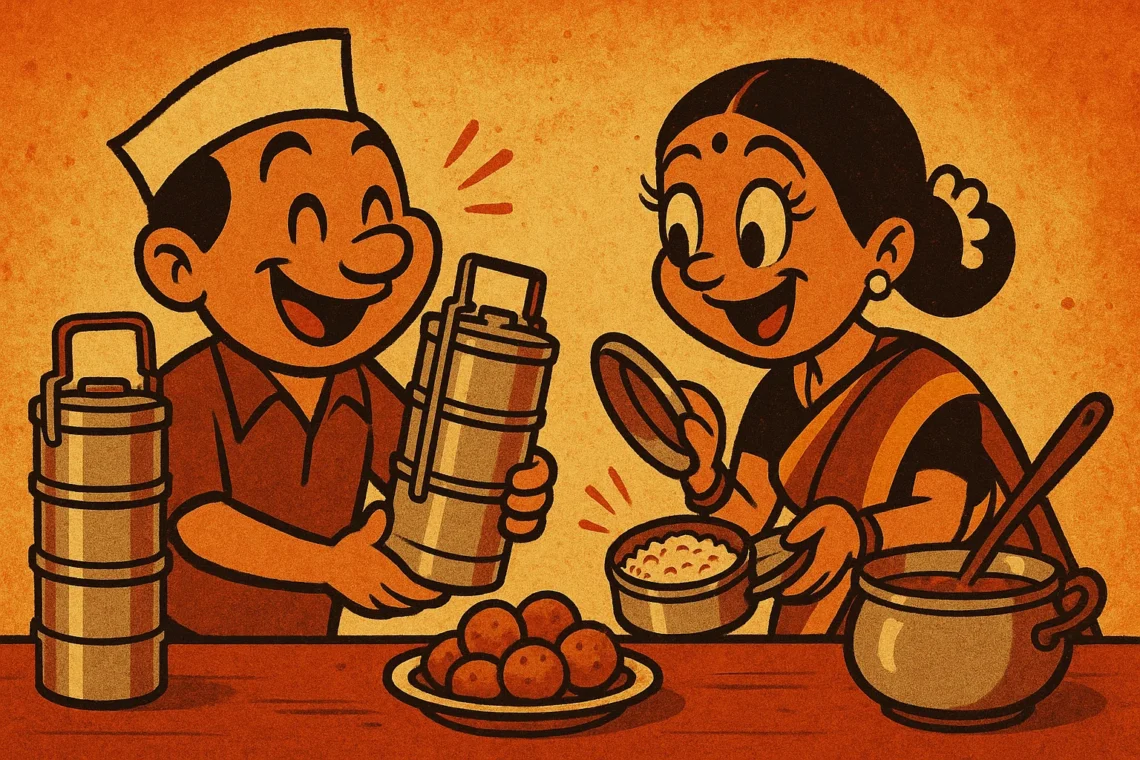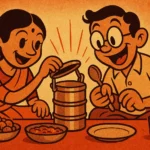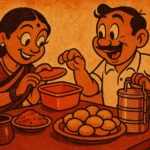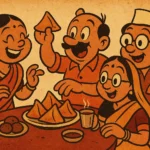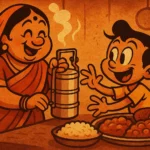I used to think my mother was writing me letters every day. Not with a pen, but with a steel tiffin box. The kind that has multiple compartments, a snug lid, and that unmistakable clack when you close the latch. The kind of dabba that smells like home, even after a thousand dishwasher cycles. It was only later—years later, sitting in an air-conditioned office cubicle in Austin with a microwaved burrito—that I realized those dabbas were love notes I didn’t know how to read at the time.
Growing up in Mumbai, I carried a dabba to school that looked like it had survived the Battle of Kurukshetra. Dented on the side, the handle replaced with a red thread and some jugaad, it was a loyal companion. Inside, there was always something simple: methi thepla with mango chhunda, or aloo sabzi rolled inside chapatis. My mother never asked what I wanted for lunch—she just knew. That was the language we spoke.
Every dabba came with a rhythm. The first tier was for the dry sabzi. The second, a bit of dal or kadhi sealed tight with a plastic wrap so it wouldn’t leak into my bag (which it always did). And then, a tiny steel katori—often misaligned—containing something sweet. A piece of kaju katli or a spoon of shrikhand that told me, “Today’s a good day.” I never said thank you. You don’t thank someone for breathing.
Ghar Ka Khana on Four Wheels
Somewhere in this daily ritual was the unsung hero of Mumbai’s culinary ecosystem: the dabbawala. These men, with their bicycles and sixth-sense logistics, delivered tens of thousands of home-cooked meals every day to office-goers across the city. In a metropolis obsessed with speed and sweat, the dabba was a pause button. You could be in a glass-paneled building in Nariman Point, but when you opened that dabba, you were back in a small Borivali kitchen, the smell of jeera-tadka hanging in the air.
I remember once, a friend in school opened his dabba and recoiled. His mother had packed karela. The kind with that menacing bitter edge. He slammed it shut dramatically and looked at me like he’d been wronged. Years later, I saw that same guy at a dinner party in Houston, making crispy karela chips and talking about “nutrient density” like it was a TED Talk. That’s the thing about dabbas—they grow on you. They age like memory.
The Tupperware Betrayal
In the US, my first job out of grad school didn’t allow steel containers in the office microwave. “It’s a safety issue,” they said. So, I betrayed my roots and bought a set of Tupperware. The food tasted the same, technically. But it didn’t feel right. No clink of steel. No aroma escaping from the tight-fitting lid. No chance of a wayward mustard seed landing on your tie. The food had lost its accent.
At home, though, I clung to the old ways. I still pack my son’s lunch in a steel dabba, even though he prefers PB&J. One day, I snuck in a small box of upma with a cashew or two on top, just to test the waters. He came back with the box empty and said, “It was weird… but good.” A win, I think.
Emotions, Layered
The dabba isn’t just a vessel. It’s a map of someone’s heart. It tells you who they are, what they care about, and how far they’re willing to go to make sure you’re okay at 1:15 p.m. on a Thursday. I’ve seen dabbas packed with surgical precision—parathas folded like origami, chutney in its own sealed pod, salad sprinkled with chaat masala just so. And I’ve seen the frantic ones too—scrambled packing, cling film over leaking sambhar, and still, somehow, a note of affection in the chaos.
Even now, on days when the world feels particularly loud, I’ll open my lunch at work and the scent of ajwain in the paratha will take me straight back to 1995, sitting cross-legged on the school bench, trading bhindi for someone’s noodles. Or not trading. Some things were sacred.
More Than Just a Meal
Food in a dabba is not made for Instagram. It’s made to last on a humid train ride. It’s made for the desk that doesn’t come with a break room. It’s made to carry not just lunch, but language, memory, migration. My grandmother used to pack food for my father, who then packed for me. Each generation sneaking in its own variation. A sprinkle of curry leaf here, a dollop of pickle there. The act of packing a dabba is not just utilitarian—it’s ceremonial. It’s how we say, “I know your day will be hard, so here’s a little softness between bites.”
And that’s why a dabba, in all its scratched and steamed and reused glory, is not just a lunchbox. It’s a letter. A poem written in mustard seeds and coconut. And if you’ve ever opened one, hungry and far from home, you know exactly what I mean.
Born in Mumbai, now stir-frying feelings in Texas. Writes about food, memory, and the messy magic in between — mostly to stay hungry, sometimes just to stay sane.

